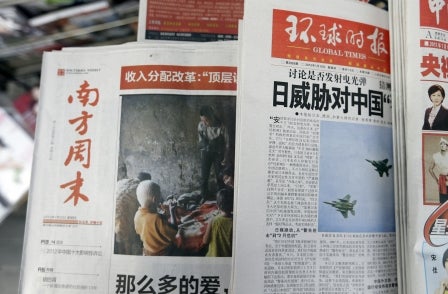
A strike by journalists in China last week will see propaganda offices around the country “think twice” before attempting to interfere with editorial policy, according to The Times Beijing Bureau chief Leo Lewis.
The protest has been hailed as a significant development in a country renowned for its poor press freedom standards.
Although the protest initially targeted propaganda chiefs who changed an editorial in the Southern Weekly, it quickly escalated into a broader debate on the country’s press standards.
The row began when a New Year front-page column calling for guaranteed constitutional rights was changed by censors into a piece praising the communist Party.
In response, 85 current and former members of editorial staff signed a letter urging a provincial propaganda chief to step down.
Although an article on the newspaper’s official blog described these “online rumours” as false, it resulted in journalists going on strike, a public protest and international coverage. Now the Beijing News has refused to republish an editorial condemning the journalists in an apparent sign of solidarity.
Southern Weekly journalists have since reportedly agreed to go back to work, public protests outside the paper’s Guangdong offices are ongoing.
“What happened to the Southern Weekly was a pretty striking attack on the paper’s editorial,” Lewis told Press Gazette.
“It is not just that this editorial had been hijacked, it is that this happens all the time. That is the problem.”
Lewis, who was reporting from the protest this week, believes that the short term impact of this week’s strike will mean that propaganda offices around the country will “think twice before pulling this type of thing again”.
“In the long term it could lead to internal conflict within the Communist Party,” he said.
“There is a school of thought within the party which supports more freedom of the press.”
The Guardian’s China correspondent Tania Branigan told Press Gazette that journalists often attempt to “push the boundaries and sometimes voice frustrations” but she suggested this was different.
“It is very unusual to have such an open and direct confrontation with authorities,” she said.
“It’s important to remember that, while many in the Chinese media would like greater freedom in their work, this did not start as a call for reforms.”
Branigan added: “It developed out of the reaction against what the journalists saw as a major change in the status quo – greater interference – within a context of concern about other recent moves.
“It escalated following the authorities’ response, drawing in more people and becoming a broader debate.”
Daily Telegraph Shanghai correspondent Malcolm Moore was also pleased to see the protests taking place, but revealed that not all Southern Weekly journalists are involved.
“It is depressing, at least to me, that so few journalists inside the Southern Weekend and indeed the Beijing News followed the courageous example of their editors,” he told Press Gazette.
“We were told there were only around a dozen strikers, even though there are crowds of supporters downstairs and global media attention on their case.”
Email pged@pressgazette.co.uk to point out mistakes, provide story tips or send in a letter for publication on our "Letters Page" blog
